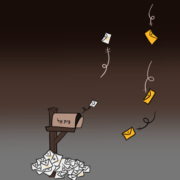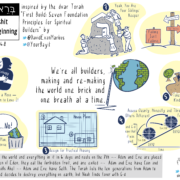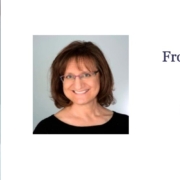Toldot: Struggling, Scampering, and Romping

Part of an ongoing series that explores Torah through an ethic of social justice and building a world worthy of the Divine.
The stories of twins in the Bible always catch my attention, because my father was an identical twin and my nieces are fraternal twins. I never knew my uncle – he died when I was an infant – but I’ve heard enough stories about him and my dad to know that although they looked like mirror images of each other, they were entirely different. The same is true of my nieces; they look so much alike that it’s easy for outsiders to confuse them, but their personalities are almost diametrically opposed.
So too with Esau and Jacob, whose birth is recorded in parashah Toldot. Their mother Rebecca knew they were different even before they were born; the Torah tells us that “the children struggled in her womb.” But turning to the Hebrew, I noticed that the verb which is usually translated as “struggled” is better translated as to run around, or to scamper, to romp. Even, according to my dictionary, to gambol. These definitions imply a more playful, or at the very least, a positive, interaction.
It didn’t feel that way to their mother. Rebecca went straight to the source (the Source) to ask what was happening in her womb, and God told her that the children within her represented two separate peoples. And sure enough, when born they were quite different in appearance, and as they grew, they became very different kinds of men.
If left to their own devices, the brothers might have been able to forge a relationship that acknowledged their differences, in which their complementary natures could be accepted and even celebrated. That was not to be, because their parents could not help themselves. Each had a favorite and made no secret of it.
And early on in their relationship Jacob took advantage of his brother and purchased his birthright in exchange for a bowl of stew. It was a decision that Esau didn’t even understand when he made it and which he came to regret. What, one wonders, did a birthright look like to him? Was it simply his father’s blessing? Or did it carry inherent benefits that he would lose in adulthood? In the heat of the moment, his impulsiveness got the better of him and he gave up something of enormous intrinsic value.
Like Esau, we can’t turn the clock back. We can only grapple with the realities that we created, and those we inherited. To achieve justice in a world that often feels completely unjust is a monumental task that involves understanding that decisions made long ago affect us today. The only remedy is to look forward, not backwards. The past is beyond our control. But we can move forward if we learn to let go of old hurts and misunderstandings.
I know this may sound overly optimistic and perhaps even naive, but I think the only way to seek solutions to the serious problems that plague our society is to forget about past hurts and slights, and listen to each other today. Instead of struggling against one another, let’s scamper and romp. Let’s embrace our differences. Let’s try to see each other as parts of a whole, each different and distinct, each necessary, each worthy of respect, worthy of freedom, worthy of justice.


Rabbi Jennifer Singer, a founding builder at Bayit, is a builder with Bayit’s Liturgical Arts Working Group and serves congregation Kol Haneshamah in Sarasota, FL.
Illustrator Steve Silbert, a member of Bayit’s board of directors, is lead builder for Visual Torah and Bayit Games.









